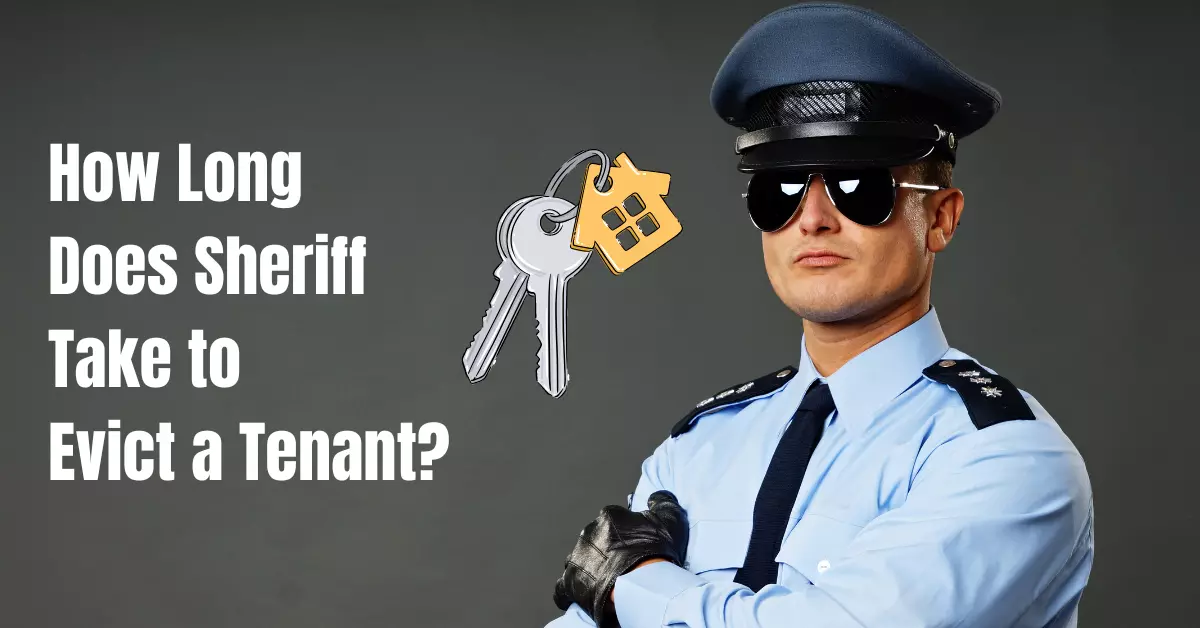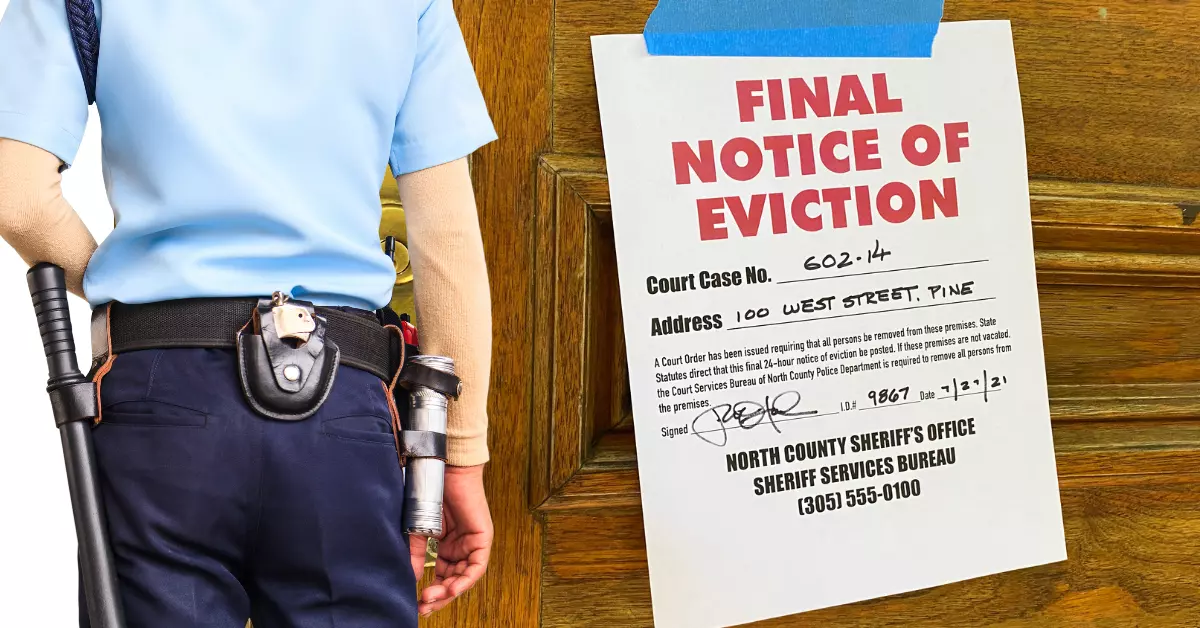How Long Does Sheriff Take to Evict a Tenant?
The time it takes for a sheriff to evict a tenant varies but typically ranges from a few days to a few weeks after the court order. This period allows for legal notice to be served and for tenants to vacate voluntarily before the sheriff enforces the eviction.
In most cases, a sheriff or constable will need to serve the tenant with an eviction notice and physically remove them from the premises.
However, the exact timeline for this process varies depending on several factors, including the state and county where the eviction is taking place.
In this article, we’ll explore the factors that can influence the length of time it takes to evict a tenant and provide some tips for navigating this complex process.

Understanding The Sheriff Eviction Process
Evicting a tenant is a challenging process, and many landlords require legal assistance to do it. The sheriff eviction process is a crucial element of legal eviction, and landlords need to understand how it works.
Here’s a brief overview of the sheriff eviction process:
- The sheriff is responsible for carrying out the eviction process and ensuring that the tenant vacates the premises before the deadline.
- The tenant receives an eviction notice that includes the deadline by which they need to leave the property.
- If the tenant fails to leave by the deadline, the landlord files a court order requesting that the sheriff evicts the tenant.
- Once the court order is granted, the sheriff will schedule a date for the eviction.
How The Sheriff Eviction Process Works
The sheriff eviction process involves several steps that a landlord must follow to successfully evict a tenant. Here’s how the process works in detail:
- The landlord must legally terminate the lease or rental agreement and provide the tenant with an eviction notice.
- If the tenant fails to leave the property by the deadline specified in the eviction notice, the landlord files an eviction lawsuit in court.
- If the court orders the tenant to vacate the property, the landlord can request the sheriff to carry out the eviction.
- The sheriff posts a warning notice on the property and provides the tenant with a notice of eviction.
- The sheriff is also responsible for removing the tenant’s belongings from the property and changing the locks.
Steps Involved In The Sheriff Eviction Process
The sheriff eviction process is a complicated procedure that requires diligence and attention to detail. Here are the critical steps involved in the sheriff eviction process:

Provide the tenant with an eviction notice
The landlord must provide the tenant with a written notice of eviction, outlining the reasons for eviction and the date by which the tenant needs to vacate the property.
File an eviction lawsuit
If the tenant fails to comply with the eviction notice, the landlord must file an eviction lawsuit in court.
Attend a court hearing
The landlord must attend a court hearing and present their case to the judge, who will either grant or deny an eviction order.
Obtain an eviction order
If the judge grants the eviction order, the landlord may request the sheriff to carry out the eviction.
Schedule the eviction
The sheriff will schedule a date and time to carry out the eviction and provide the tenant with a notice of eviction.
Carry out the eviction
On the scheduled date and time, the sheriff will remove the tenant’s belongings from the property and change the locks.
Factors That Affect The Duration Of Sheriff Eviction
Renting out a property to tenants involves multiple intricacies and aspects that significantly impact the duration of eviction.
Understanding the factors that affect the duration of sheriff eviction is vital for a landlord seeking eviction of a tenant.
The Type Of Tenancy Agreement
The type of tenancy agreement plays a crucial role in determining the duration of eviction.
An oral agreement or a month-to-month agreement gives landlords a degree of flexibility in eviction, while written agreements tend to have specific clauses that affect eviction and might take more time.
If the tenant breaches the agreement, the eviction period might still vary depending on whether it is a fixed-term agreement or a periodic tenancy.
In cases of written leases, landlords might also need to consider the clauses being violated and the penalties associated with the breach.
Tenant’s Defense’s And Appeals
The tenant’s defenses and appeals could also lengthen the sheriff’s eviction period. Tenants might choose to defend themselves in a court of law, leading to extra court hearing days and can significantly slow down the eviction process.
Similarly, if the tenant files an appeal, the eviction period can be suspended for weeks or even months.
- When a tenant files an appeal, the eviction process is automatically suspended.
- In some states, tenants can request a stay of proceedings, stopping the eviction process for a specified duration.
- If the tenant’s defense is successful, it can lead to a dismissed eviction case, which means the landlord cannot take further action against the tenant.

Local And State Laws And Regulations
State and local laws and regulations also significantly affect the duration of sheriff eviction.
While some states have more tenant-friendly laws, others prioritize protecting the landlord’s rights. Understanding these laws is vital for landlords seeking eviction.
In some states, landlords may need to provide a legal notice before filing an eviction lawsuit, while other states have no such requirement.
Some counties have a tenancy protection ordinance, which stops landlords from evicting tenants for specific reasons like a sudden increase in rent.
In addition, some states have special protections for tenants who are active military personnel or victims of domestic violence.
Complexity Of The Case
The complexity of the case – whether it involves multiple tenants or circumstances – also affects the duration of sheriff eviction.
Cases with multiple tenants may lead to more court hearings, while complicated circumstances may require extensive paperwork.
- If the eviction process involves multiple tenants, it can take longer as each tenant must receive legal notice.
- The landlord must provide proof of the tenant’s misconduct, which may take time to gather.
- If the tenant has made significant repairs to the property, it might be challenging to prove the case in court.
Frequently Asked Questions On How Long Does Sheriff Take To Evict A Tenant?
How Long Does The Eviction Process Typically Take?
The eviction process can take anywhere from a few weeks to several months, depending on the specific circumstances of the case.
What Factors Can Delay The Eviction Process?
Factors that can delay the eviction process include tenant defenses, court hearings, and appeals.
Can A Tenant Fight An Eviction And Stay In The Property?
Yes, tenants can fight eviction by presenting viable defenses, such as non-payment of rent or substandard living conditions.
What Happens If A Tenant Does Not Leave After An Eviction?
If a tenant does not leave after an eviction, the sheriff will typically be called to physically remove them from the property.
Conclusion
When it comes to eviction, timing varies, but typically a sheriff takes 2-4 weeks to carry out the process.
Understanding your rights as a tenant can help you navigate this complex and often stressful event, ensuring you’re fully prepared for the challenges you may face.
Reference
https://guides.sll.texas.gov/landlord-tenant-law/eviction-process